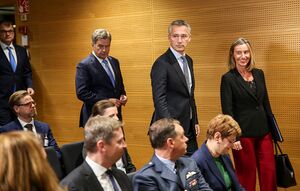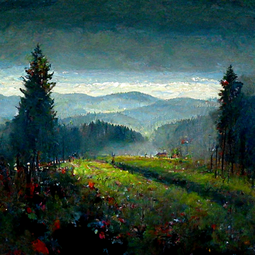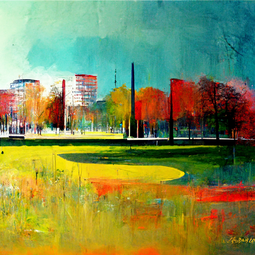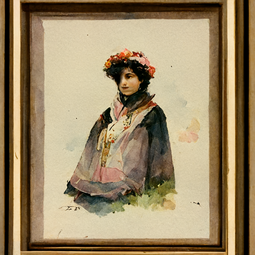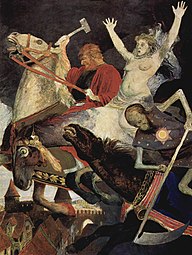User:Poshyte/Sandbox7
Federal Republic of Alsland | |
|---|---|
| Motto: Tegearre (Dellish) Koos (Kirenian) Together | |
| Anthem: Aalslânsk grûn (Dellish) Alslandic ground | |
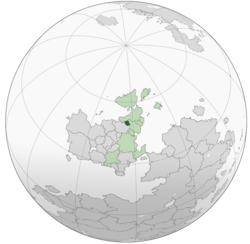 Alsland (dark green) in Euclea (light green and dark grey) and in the Euclean Community (light green). | |
| Capital and largest city | Yndyk |
| Official languages | Dellish Kirenian |
| Recognised regional languages | Estmerish Holsaten Swathish |
| Ethnic groups | 64.7% Dellish background 21.9% Martish background 13.4% Other background |
| Religion |
|
| Demonym(s) | Alslandic |
| Government | Federal parliamentary republic |
| Hepke Veltman | |
| Legislature | Folkssenaat |
| Independence from Kirenia | |
• Declared | 1919 |
• Recognised | 1921 |
| Area | |
• | 46,789 km2 (18,065 sq mi) |
• Water (%) | 1.2% |
| Population | |
• 2020 estimate | 11,501,738 |
• 2019 census | 11,384,499 |
• Density | 243/km2 (629.4/sq mi) |
| GDP (PPP) | 2020 estimate |
• Total | €564.5 Billion |
• Per capita | €49,583 |
| GDP (nominal) | 2020 estimate |
• Total | €539.3 Billion |
• Per capita | €47,374 |
| Gini (2020) | 34 medium |
| HDI (2020) | very high |
| Currency | (€) Euclo (EUC) |
| Date format | dd-mm-yyyy |
| Driving side | right |
| Calling code | +32 |
| Internet TLD | .as |
Alsland (Dellish: Aalslân; Kirenian: Aalsmaa), officially the Federal Republic of Alsland (Dellish: Bûnsrepublyk Aalslân; Kirenian: Aalsmaa Liitvabariik), is a country in Northern Euclea. It is bordered by Werania to the north, Estmere to the east and Kirenia to the west. It covers an area of 46,789 km2 (18,065 sq mi) and has a population of more than 11.5 million. The capital and largest city is Yndyk which forms part of the larger Ynsted metropolitan area with Wottested. The country is comrpised of 2 distinct ethnic communities: the Dellish Community and the Martish Community. The Dellish Community makes up over 2/3rds of the country's population and also is home to the country's political, population and economic centres. The Martish Community retains a distinct identity from the Dellish Community and has a high degree of autonomy and a developed economy. Other smaller Communities include the Estmerish Community, the Holsaten Community and the Swathish Community.
Alsland was first inhabited by Weranic tribes since antiquity. Alsland was also home to Tenic tribes and Kirenian peoples. Due to the Neeves mountain range Alsland was isolated from the Solarian Empire. After the collapse of the Solarian Empire various petty kingdoms rose throughout Alsland the most notable being the Duchy of Delland and the Principality of Wottested which were both members of the Rudolphine Confederation. The Amendist Wars saw the country split along religious lines and two separate Dellish identities being formed as a result. The region was entirely annexed by Kirenia in the aftermath of the Ten Years' War.
The existence of the Transneevan Republic during the Euclean Revolution Wars created a unified plurinational cultural identity in the region between Amendist and Catholic Dellanders which further developed during the Industrial Revolution in Alsland. The region remained separate from the rest of Kirenia and declared independence in 1919 which resulted in the large Kirenian speaking population of Martiland to be transferred to the fledgling state. The 1920 Constitution of Alsland created the country's current federal structure and gave autonomy to the various ethnic groups in the country. Alsland was devastated by the Great War which was partially fought inside it's borders. Alsland later joined the Euclean Community in 1955.
Alsland is a federal parliamentary republic, it has long been regarded as relatively stable and tolerant for it's multi-ethnic and multicultural identity. It has a highly developed economy and attracted over 30 million tourists in 2017, it is also a premier destination in Northern Euclea for winter sports owing to it's location in the Neeves. The country is a member of the Euclean Community, the Northern Forum, the AEDC, ECDTO, the International Council for Democracy and the Community of Nations.
Etymology
- Weranic tribe
- Usage post-Revolution
- Alternate names
History
Weranic tribes
- Immigration into Alsland
- Solarians
Early Middle ages
- Petty Kingdoms
- Kingdom of the Fawkish
Middle ages
- James the Great and Fawkish domination
- Rudolphine Confederation
- Amendist War
Kirenian rule
- Kirenian annexation
- Werdau revolution
- Industrial centre
- Dellish People's Party
- Great collapse
- Airdale war
- April revolution
Independence and July Crisis
- Dellish revolution
- Republic of Delland
- July Crisis
- Buffer state
- Land reform and pillarisation
Great War and modern era
- Reconstruction
- Joining the EC
- Euclean democracy
Geography
- Neighbouring countries
- Area
- Neeves
- Natural resources
Climate
- Climate types
- Average temperature
- Percipitation and sunlight
- Temperature extremes
Neeves
- Neeves mountains
- Mt Verdant
- Other important mountains
Biodiversity
- National parks
- Forests
- Native animals
- Flora
Politics and Government
Government
Political culture
- Needs to be nuked
Communities, Provinces and Municipalities
- Communities
Alsland is divided into 18 Provinces. The provinces of Alsland each are members of a community and each province has a high level of autonomy with their own governments, legislatures and constitutions. Whilst the provinces do have legislative power this has largely been rendered obsolete since the creation of the Community governments and municipal authorities. The most populated province is X with X inhabitants. The largest province by area is Fawkhamshire which is also the least densely populated province. Wottested is the smallest province by area but has the highest population density of every province.
Local authorities—Municipalities—which are the lowest level of administrative division in Alsland. As of the 2001 Municipal reform which doubled the amount of municipalities there are over 300 in Alsland. Municipalities in Alsland are in control of social care, schools, housing and planning and waste collection as well as other local services. In about half of municipalities legislative authority is exercised by a public meeting of all registered voters in the Municipality which is the only form of direct democracy in Alsland. Municipalities are financed through direct taxes collected by each Community government and these vary between each Community with the highest rates being paid in Delland and Swerdia.
Law
- Supreme court
- Rehabilitation
- Crime rate
Foreign relations
Foreign relations of Alsland are handled by the Department of Foreign Affairs and the Secretary of Foreign Affairs. Alsland maintains embassies and consulates in most countries around the world. Yndyk is home to several dozen foreign embassies.
Alsland has been a member of the Euclean Community since 1955. Alslandic policy towards the EC has become progressively more euclofederalist. Successive Alslandic governments have endorsed plans for a single EC army and backed further integration of EC member states. During Bonne Zijlstra's tenure as President of the Euclean Community, Alsland's linguistic diversity was frequently used as a model for a potential united Euclean state. Within the EC, Alsland has frequently aligned itself with smaller member states such as Azmara, Borland, Caldia, Hennehouwe and Kesselbourg. Alsland has a particularly strong relation with Azmara and Borland which has led to the term "Alsbora" to be used when referring to the three countries collectively.
Alsland has a unique relationship with Kirenia. Alsland has generally more positive relations with the country and post-independence had a pro-Kirenian foreign policy particularly after the Estmerish-Weranian invasion and occupation of Delland. The Kirenian-Weranian war led to an outbreak of ethnic violence in Alsland such as the 1950 Rahu riots which left several people dead. Overtime Alslandic foreign policy has drifted towards eastern Euclea however Alsland maintains strong relations with Kirenia and other MASSOR member states.
Furthermore, Alsland is a founding member of the Community of Nations and the International Council for Democracy. It is also a member of the Euclean Common Defence Treaty Organisation (ECDTO), the Association for Economic Development and Cooperation (AEDC), the International Trade Organization (ITO), the Global Institute for Fiscal Affairs (GIFA) and the Estmerish Community.
Armed Forces

The Alslandic Defence force (Definsjemacht) currently numbers 28,000 active personnel. In 2020 the defence budget was set at €5.932 Billion (1.1% of Alsland's GDP). The Definsjemacht is split into 3 branches, the Federaal leger (ground forces), the Federale loftmacht (air force) and the Federale garde (home guard). Until 1968, Military service was compulsory for Alslandic men at age 18 but this was changed and since 1970 the Definsjemacht has operated on a purely voluntary service unless in wartime when conscription may be reintroduced.
The President is the commander in chief of the Alslandic armed forces, since 2018 this has been Hepke Veltman. The Secretary of Defence is usually a former or current member of the Armed Forces. The last conflict Alsland was involved in militarily was the Great War however the Definsjemacht has been deployed on several occasions since then most notably in 1975 during the Martiland Strikes and in 1995 during the Euclogaos protests. It was deployed most recently in 2021 after the Yndyk train bombing as part of a broad scheme to help law enforcement prevent future terrorist attacks. Definsjemacht soldiers have since been spotted at key transport hubs such as train stations and airports.
Economy
- Brief description
- Adoption of the Euclo (Euclogaos)
- Notable exports/imports
- Financial centres
Financial
- Yndyk stock exchange
- Financial & services sector
Tourism
- Annual visitors
- Skiing
- Cultural sites
Infrastructure
As of 2020, 48% of Alsland's energy production came from nuclear power and other renewable sources. Nuclear power is Alsland's largest source of electricity. Despite this in 2012, the liberal led government backed a proposal by the green party to phase out nuclear power by 2035. The move was criticised by other environmental groups and sparked backlash against the government. Despite this subsequent governments have affirmed the timeline of phasing out nuclear power in Alsland. Anti-nuclear activists also blocked the construction of a nuclear power plant in 2011.
Due to Alsland's central location in Northern Euclea it is a transport hub between several neighbouring states. The motorway system in Alsland, the Autodyk in Dellish, the Autobahn in Weranian and the Kiirtee in Kirenian, spans the entire country. The Autodyk spans 1,747 km (1,086 mi) across Alsland and spreads across each province in the country. Each section of the Autodyk is operated and managed by the province it is in. Alsrail, the national rail transport operator is the most used form of public transportation in Alsland, it also connects with neighbouring countries and the Euclostar network. There are over X km (X mi) of rail track in Alsland. Since 2017, cycling infrastructure has seen a large expansion notably in the Yndyk Province. This has coincided with a federal campaign to promote cycling in Alsland. As of 2020 there are 218 km of cycling lanes in Yndyk making it the Xth most bike-friendly city. On average 153,211 or 24% of Yndyk's population now commute to work via bike.
The largest airports in Alsland are Wottested-Yndyk International Airport, Yndyk City Airport and Leofham International Airport. Over 26,000,000 passengers flew through Wottested-Yndyk International Airport in 2020 making it the Xth busiest airport in Euclea.
Demographics
- Population density
- Population growth and population pyramid
- Average age
Migrants
- Immigration
- Largest migrant communities
- Restrictions on non-EC immigration
- % of foreign born Alslandic citizens
 Werania
Werania- Template:Country data Estmere
 Kirenia
Kirenia Hennehouwe
HennehouweGaullica
Piraea
 Mabifia
Mabifia Etruria
Etruria Zorasan
Zorasan Shangea
Shangea
Language
Alsland has two federally recognised languages: Dellish which is by far the most spoken language in the country and Kirenian which is spoken by the country's Martish minority. Alongside the two federally recognised, 3 other languages are recognised in specific locations in the country and are recognised as "languages of regional importance" which mandates federal officials as well as selected regional and local officials in these areas provide services in the language. These languages are: Estmerish spoken by the Estmerish Community in Alsland, Holsaten which is spoken in Holsteen and is sometimes considered to be a dialect of Weranian but is recognised by Alsland as a separate language and Swathish which is spoken in Upper Swerdia. All federal services are required to provide translations into every language. Speeches to the Folkssenaat are required to be translated by translators. Broadcasts in minority languages are required by law for the Alslandic News and Radio service and other regional public broadcasters, other private and foreign broadcasters are required to provide subtitles into each language by law.
As of 2019, ~65% of Alslanders were native Dellish speakers and spoke the language at home; ~21% were native Kirenian speakers; ~2.4% were native Swathish speakers; ~2.2% were native Holsaten speakers; ~2.1% were native Estmerish speakers and ~6.4% spoke a range of other languages at home regularly. Gaullican was the most spoken foreign language in Alsland although significant minorities of Piraean, Vespasian and Putonghuan speakers exist.
Many areas of Alsland are recognised as multilingual; whilst Holsaten is the official language of Holsteen it has a large population of Dellish speakers and both have co-equal status in the region. The entire Ynsted metropolitan area has also become increasingly multilingual through internal migration which has shaped the country's internal demographics. The Sleat region in Swerdia has a majority Dellish speaking population despite being inside the Swathish Community, other linguistic exclaves exist across the country.
Alslandic students are required to learn at least 3 languages in schools until the age of 16. These generally include two 'domestic' languages – most often Dellish and Kirenian – and one 'foreign' language which is usually Gaullican. Schools in Burnshire, Holsteen and Upper Swerdia also teach the minority languages alongside one other 'domestic' language. Consequentially, most Alslanders also claim to be proficient in two or more languages. According to the 2019 Federal census, 96% of adults were polyglots which is the highest rate of multilingual speakers per capita in the world. Most Alslanders also claim to speak more than one language on a daily basis in either the education system, employment or communication with others.
Religion
Alsland is a secular state has no official state religion and the Constitution of Alsland guarantees freedom of religion for citizens in the country. 45.6% of the country follows any form of Sotirianity; 25.1% claim to follow Solarian Catholicism, 24.4% follow various forms of Amendism and 6.1% follow other forms of Sotirianity. The largest Sotirian church in the country is the Reformed Church of Holsteen (RKH) which is also the largest Solarian church in the country, the largest Amendist church in the country is the Church of Martiland and Lanekirik (MLK). Other large Amendist churches in Alsland include the Unified Amendist Church of Upper Swerdia, the Reformed Humanist Church of Alsland and the Church of Delland. Approximately 41% of the country claims to be irreligious which is the second highest rate in Northern Euclea after Caldia.
Sotirianity was introduced to Alsland during the 9th century, the region of Alsland was mostly Catholic until the Amendist Reaction which took hold in Upper Swerdia and eastern Delland as well as Martiland led to Alsland being the site of numerous battles during the Amendist Wars. After the Amendist Wars Alsland became split 60-40 between Amendists in Swerdia, Martiland and Wottested whilst Catholicism remained the dominant denomination in Holsteen and western Delland. After the region was annexed by Kirenia following the Ten Years' War Alsland remained split along the lines of religion which continued until the Trans-Neeven Republic when a key policy of the Republic was creating a shared identity between Amendists and Catholics in Alsland. After the end of the War of the Triple Alliance the Republic was reincorporated into Estmere and Kirenia although the shared identity remained strong even until the Dellish revolution and the independence of Alsland. After the Great War the number of people professing to be irreligious has grown exponentially. As a result of this the Amendist majority in Alsland became a minority and in 2019 Catholics outnumbered Amendists for the first time in Alsland.
According to a 2017 poll, 34% of Alslanders said they believe there is a God, 28% believe there is some sort of spirit or life-force. 36% responded by saying they did not believe there was a god or any sort of spirit or life-force, 2% did not answer the poll. According to the same survey, church attendance in Alsland had fallen to an all time low of only 9% of Alslanders claiming they attended church on a regular basis which is down from 24% in 1993.
Health
Healthcare in Alsland is a publicly funded universal health care system financed by government backed mandatory national health insurance where the government manages and regulates healthcare from public and private institutions. Prior to the 2008 Healthcare reform act, health insurance in Alsland was mandatory and it was illegal for private health insurance companies to refuse insurance to anyone. Since the reform Alsland's already adequate healthcare sector has become one of the best in the Euclean Community and it was ranked as the best in the EC in 2014. The country spends 12.4% of it's GDP on healthcare annually which is one of the highest rates in Euclea. In 2019, 72% of Alsland's healthcare system was covered by government funded agencies. Responsibility for healthcare is exercised through the federal government which funds the system as well as Community governments who have limited powers over healthcare.
According to a 2021 study, Alsland has a very high life expectancy of 79.24 years for men and 83.77 years for women. The same study also recorded a fertility rate of 1.39 births per woman in Alsland. According to the Community of Nations Commission for Disease Prevention & Health, there are 2.98 physicians per 1000 inhabitants although this number varies between each region of Alsland with Delland having the highest number of physicians per 1000 inhabitants and Upper Swerdia having the least number of physicians in all of Northern Euclea, the Commission criticised healthcare inequalities present between different regions in it's final report. Obesity is one of the biggest health issues in Alsland like much of the rest of the developed world, 19.4% of people in Alsland are considered to be obese and childhood obesity rates have increased since the 1970s.
In 2019, the Swathish Community legalised Euthanasia and became the first area in Alsland to do so. The legalisation had first been proposed federally in 2017 although these plans were never implemented. Euthanasia is legal if the patient requests it, the patient is suffering and their condition is not expected to improve, the patient is at least 17 years old and if an independent committee of review approves the request. It is also legal for doctors to refuse to carry out euthanasia in which case another willing doctor will be asked to carry out the process. Shortly after the legalisation the Supreme Court of Alsland ruled that patients in other regions wishing to be euthanised were allowed to travel to the region for the service.
Education

Education is compulsory between the ages of 6 to 16 and is regulated by the Department of Education although the curriculum differs between each community who also operate separate exam boards and oversight authorities. Compulsory education is free in Alsland if a student attends a public school, however independent schools also operate in Alsland. Between the ages of 6 and 12 or Grades 1 to 6, students attend Primary School which offers a basic curriculum which is similar nationwide. Students aged 13 to 16 or Grades 7 to 10 attend unified secondary schools in everywhere but Holsteen where secondary education is split into Lower Secondary and Higher Secondary. In Grade 10, students sit the mandatory 'Advanced certification of education examination' (ASUE/FZB/16+L).
After their final secondary examinations students can choose to enrol in a gymnasium which teaches students between the ages of 17 and 18. After completing their course, students will sit the 'National Gymnasium Certification examination'. Trade schools are also a popular form of post-secondary education in Alsland and provide students a vocational education. Gymnasiums and Trade schools are partially funded by both the federal and community level governments.
Tertiary education in Alsland is subsidised by the Alslandic government to make it affordable for Alslandic students. The largest university in Alsland is the University of Yndyk which has over 30,000 enrolled students across it's campuses. As of 2021, 17.1% of students in tertiary education in Alsland are international students with most being from countries neighbouring Alsland or EC member states.
Culture
Art
Mart Mets' 1822 Neevan Springtime is a notable early piece of Impressionist artwork.
Nelis Meyer's 2002 Abstract painting of the Loykensbrêge district is an example of modern abstract paintings.
A 18th century depiction of the Ten Years' War in Alsland referred to as the De slach fan 'e dea painting.
- Famous artists over time
- Notable art pieces
- Art museums
Literature
Music
- Local music
- Classical music
- Modern music & famous artists
Media
Sport

The most popular sports in Alsland are skiing, football, snowboarding and ice hockey. Cycling as well as tennis are also popular sports in Alsland. The country is famous for it's winter sports venues which attract hundreds of thousands of tourists annually during the winter months, the country is a popular skiing destination in Euclea, in 2019 over 10 million people visited Alsland's skiing slopes making it the most visited winter sports destination in Northern Euclea.
Ice hockey is considered the national pasttime of Alsland and is recognised as the official sport of Alsland. The Federal Ice Hockey League (FIHK) is the most watched sporting championship in Alsland and comprises of 26 teams from across Alsland; in 2022 the final of the league between Noardwâl Wottested and Súdwâl Wottested attracted a record 5.4 million viewers both within Alsland and globally. The Alsland men's national ice hockey team is regarded as one of the most successful in the world and has been ranked as the world's no.1 Ice Hockey team on numerous occasions. Likewise the Alsland women's national ice hockey team is also one of the best women's ice hockey teams globally.
Association football is another popular sport in Alsland. The Esimenediviis is the top league of professional Football in Alsland and is the second most popular sporting league in Alsland. The league has clubs from across Alsland and it's most successful clubs historically are BSV Werdau and FSO Yndyk which have both won the league 9 times in their histories. The Alsland national football team has been successful at various points in it's history although it has never won a world cup it has won regional contests recently.
Rugby union is a popular sport particularly in the Dellish Community. The sport's popularity has grown recently although it lags behind the popularity of several winter sports and association football in the country.
Historically, Alsland has had many successful tennis players of whom are considered to be some of the greatest players in history. Former tennis duo Marek Looke, Oda Jansen as well as Sjard Talsma are some of the most notable tennis players recently and have all been ranked as the world no.1 at some point in their respective careers. Talsma alone has won numerous Grand Slam titles in his career and is the most successful active Alslandic tennis player. At the 2022 Summer Invictus Games in Verlois Talsma and Laurenske Jansen-Looke won a gold medal in the mixed doubles event.
Alsland has participated in every Invictus Games since it's inception with the exception of 1930, 1934 and 1946. Historically Alsland has been most successful in the Winter Invictus Games than the Summer Invictus games, the country ranks highly in terms of medals won during the Winter Invictus games. The country has never hosted an Invictus games before although both Wottested and Werdau have attempted bids for the Summer Invictus games in 1978 and 2006 respectively. The country has made several bids for the Winter Invictus games although these bids were all withdrawn due to public opposition. The country was host to the 2016 Youth Winter Invictus games in Leofham where Alslandic athletes won the most medals.
Cuisine
- Most popular dishes
- Local dishes
- National dish
Holidays
| Autonomous communities | |||||||
|---|---|---|---|---|---|---|---|
| Date | Estmerish name | Local Name | Notes | ||||
| 1 January | New Year's Day | Nijjiersdei | |||||
| 12 February | Patriot's day | Patriotten dei | |||||
| 2 March | Swathish Language Day | Svạþiṡc lẏdenn dạg | Held annually to celebrate the Swathish identity | ||||
| Changeable | Easter | Peaske | |||||
| Changeable | Easter monday | Peaske moandei | |||||
| 22 April | Remembrance Day | Mälestuspäeva | Held annually following the Rahu Massacre | ||||
| 1 May | Labour Day | Dei fan de Arbeid | |||||
| 30 July | Saint Alfhard's day | Tag des Heiligen Alfhard | Celebrates the patron saint of Garz and Zittau | ||||
| 18 October | Freedom Day | Frijheidsdei | Celebrates the 1919 original declaration of Dellish independence | ||||
| 22 November | Constitution Day | Grûnwetdei | |||||
| 24 December | Nativity's eve | Krystjûn | |||||
| 25 December | Nativity | Krystfeest | |||||
| 31 December | New Year's eve | Âldjiersjûn | |||||



